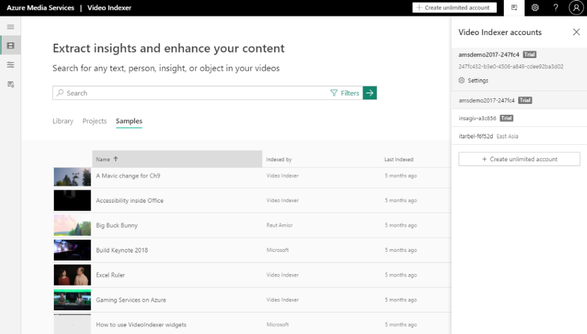- Home
- Artificial Intelligence and Machine Learning
- AI - Azure AI services Blog
- Video Indexer Introduces Expanded Regions, Multi-language Identification and Transcription and More.
- Subscribe to RSS Feed
- Mark as New
- Mark as Read
- Bookmark
- Subscribe
- Printer Friendly Page
- Report Inappropriate Content
As we approach the end of 2020, we wanted to take the opportunity to highlight some notable milestones for Microsoft Video Indexer. In recent months, we’ve added deep search for spoken words in multi-language videos and topics, lowered transcription costs, made enhancements to VI portal experience and more. The most notable advances we’ve made span the following areas:
- General availability (GA) of multi-language identification and transcription in Video Indexer
- Usability enhancements in Video Indexer portal experience addressing top customer feedback
- Extended functionality in the search API that enables search by topics
- Expanded region availability
GA of Multi-Language Identification and Transcription in Video Indexer
Video Indexer provides the unique capability of automating the identification of spoken languages within a video for transcription. This is especially useful when analyzing multi-language source content. This solution allows users to easily transcribe multi-language content without going through tedious manual preparation steps before starting the analysis. It saves time and money when it comes to processing large archives of videos. It also enables enhanced discoverability and improves accessibility.
By auto-detecting multiple languages before indexing your videos, Video Indexer simplifies the transcription and translation processes within your organization. In July, the multi-language identification capability was moved from preview to GA and is now ready for production use. There is no pricing impact from the "Preview to GA" transition. You can find a more detailed overview of this capability in this blog post. You can also refer to the Video Indexer documentation for full details.
New Portal Experience
The Video Indexer Portal is an out-of-the-box offering that allows customers to explore, learn, try, and even run limited Proof-of-Concepts (PoCs). It provides intuitive UI experience and is especially useful for low-scale scenarios such as video archives with 50 videos. We recently enhanced the portal offering with the addition of the following capabilities:
- The portal UI now supports mobile devices. By adapting to your mobile screen size (excluding customization UIs), the new portal gives you more seamless experience across the full range of desktop to mobile device form factors.
- The Video Indexer website experience is fully aligned with WCAG2.1, as part of Microsoft Accessibility standards. Several improvements related to keyboard navigation, programmatic access, and screen-reader were released to improve accessibility for our users.
- Improved Video Gallery. We now have a new search bar for deep insight search, with additional filtering capabilities and enhanced search results. The video gallery includes a new list of views with the ability to sort and manage video archives with multiple files (No API changes).
- There’s also a new side panel for easy selection and user configuration. It allows for simple and quick account creation and sharing and simplifies setting the configuration. The side panel is also used to provide convenient access to user preferences and help.
Search by Topics
We have enhanced the search API to enable searching on inferenced Topics to further enable you to optimize your search results. You can use the search API to search for videos with specific topics. Topics are added as part of the textScope (optional parameter).
Let’s say you have a video archive, and you would like to find videos in English-US only about web design, you would need to add the following request params: '&query=web+design' (search for videos with all the words) and '&textScope=Topics'. You can use this C# sample or refer to the Video Indexer API documentation for more details and code samples.
using System;
using System.Net.Http.Headers;
using System.Text;
using System.Net.Http;
using System.Web;
using System.Collections.Specialized;
using System.Threading.Tasks;
namespace CSHttpClientSample
{
static class Program
{
static async Task Main()
{
await MakeRequest();
Console.WriteLine("Hit ENTER to exit...");
Console.ReadLine();
}
static async Task MakeRequest()
{
var apiUrl = "https://api.videoindexer.ai";
var accountId = {put your account id here};
var location = "trial"; // replace with the account's location, or with “trial” if this is a trial account
var apiKey = {put the API key here};
System.Net.ServicePointManager.SecurityProtocol = System.Net.ServicePointManager.SecurityProtocol | System.Net.SecurityProtocolType.Tls12;
// create the http client
var handler = new HttpClientHandler();
handler.AllowAutoRedirect = false;
var client = new HttpClient(handler);
client.DefaultRequestHeaders.Add("Ocp-Apim-Subscription-Key", apiKey);
// obtain account access token
var accountAccessTokenRequestResult = client.GetAsync($"{apiUrl}/auth/{location}/Accounts/{accountId}/AccessToken?allowEdit=false").Result;
var accountAccessToken = accountAccessTokenRequestResult.Content.ReadAsStringAsync().Result.Replace("\"", "");
client.DefaultRequestHeaders.Remove("Ocp-Apim-Subscription-Key");
client.DefaultRequestHeaders.Authorization = new AuthenticationHeaderValue("Bearer", accountAccessToken);
// Request parameters
var uri = $"https://api.videoindexer.ai/{location}/Accounts/{accountId}/Videos/Search?sourceLanguage=en-us&query=design+design&textScope=Topics";
var result = await client.GetAsync(uri);
Console.WriteLine(await result.Content.ReadAsStringAsync());
}
}
}
Video Indexer Region Availability in East US
Video Indexer paid accounts can now be created in the East US region. We will continue to expand our data center availability in the coming months. See the full list of regions that Video Indexer currently supports.
If you’re not already using Microsoft Video Indexer, please sign up for a free trial.
Got questions or feedback? We would love to hear from you!
- Use UserVoice to help us prioritize the features we should work on
- Use stack overflow community for technical questions
- To report an issue with Video Indexer, follow these steps:
- Trial account customers: Go to the "Issues" tab on the Video Indexer Developer Portal and sign in. Scroll down and click "Report Issue”.
- Paid account customers: Go to Azure portal Help + support. Create a new support request. Your request will be tracked within SLA.
You must be a registered user to add a comment. If you've already registered, sign in. Otherwise, register and sign in.

